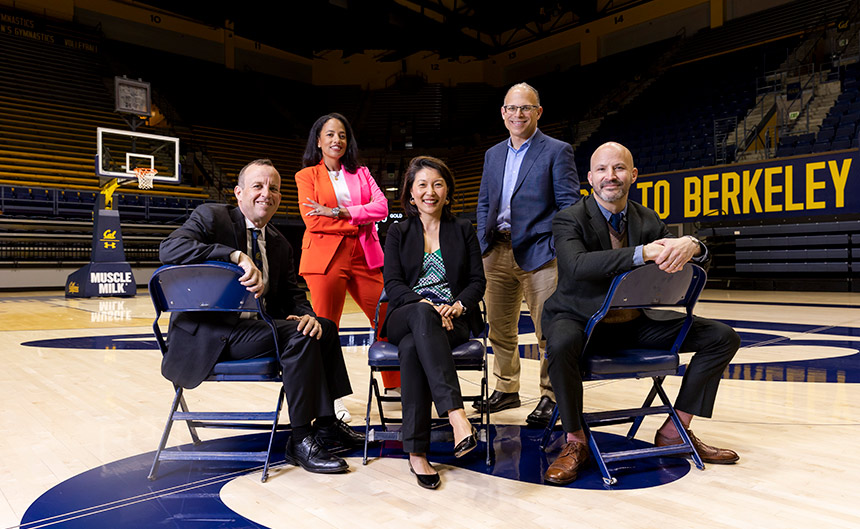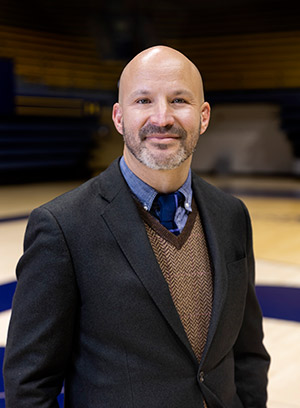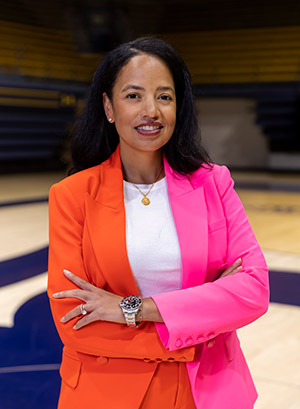
By Gwyneth K. Shaw
Berkeley Law Executive Education is adding one-on-one coaching to its roster of professional development programs, with a starting lineup of five leaders who also specialize in areas unique to the legal industry.

“If you’re at a point in your career where you are leading people and organizations, this is something you will benefit from,” Assistant Dean for Executive Education and Revenue Generation Adam Sterling ’13 says. “As professionals become more senior in their careers, work becomes less about legal expertise and more about leadership. And that’s what we’re here to address.”
Sterling is one of the first team of coaches, joined by Irene Liu ’06, Shana Simmons ’09, Mark Kahn ’00, and Ross Weiner. All but Sterling, the lead instructor for Berkeley Law’s VC University, have served as chief legal officer or general counsel.
“All of our coaches are legal industry leaders first, and coaches second,” he says. “They are uniquely situated to help clients explore challenges and opportunities around business development, leadership and management, building legal departments, and much more.”
A strong starting five
Sterling, previously the executive director of the Berkeley Center for Law and Business, says he’s encountered hundreds of general counsels and chief legal officers over the years. Liu, Simmons, Kahn, and Weiner stood out to him as people who prioritize mentorship and giving back, he says, making them ideal coaches.
“If I was asked to hire an executive coach for myself, these four would have been at the top of my list,” Sterling says.
Over the summer, Berkeley Law’s coaches worked with several senior attorneys at Salesforce as part of a pilot program for the new initiative. The coaching program is scheduled to launch in 2024, but in the meantime interested parties can reach out to Kahn, Liu, Simmons, or Weiner directly to inquire about obtaining coaching services (provided independent of Berkeley Law).

“Berkeley Law is a leader in offerings around executive education, and this is a natural continuation of that,” Sterling says. “The legal industry is increasingly turning to and utilizing executive coaches, and while there are fantastic coaches out there, very few have the deep legal experience of our coaches.
“Lawyers have a difficulty trusting non-lawyers, and I think that’s why our approach will be of interest to the community.”
Liu, who founded Hypergrowth GC earlier this year and has successfully built and scaled tech companies to multi-billion dollar valuations through M&A deals, financings, and investments, is serving as the executive education program’s first executive in residence. She’s also leading a webinar series, “Coffee Break,” that features conversations with legal leaders from a range of industries.
“In my first executive leadership role, I benefited significantly from executive coaching, so I know first-hand the positive impact an executive coach can have,” she says. “So I’m excited about the opportunity to influence and support individuals in senior positions to develop their leadership skills, enhance their decision-making abilities, and achieve their professional goals.”
Meeting a growing need
As leaders cope with increasing stress levels and burnout, coaches can help by offering personalized guidance, feedback, and support, Liu says. They can also push clients to become more agile, resilient, and emotionally intelligent — ultimately serving as a catalyst for their individual growth and the business’s success.

Liu’s deep expertise is complemented by Simmons, currently the chief legal officer at Everlaw; Kahn, a former general counsel who moved into executive recruiting; and Weiner, whose career includes multiple stints as chief operating officer and general counsel, as well as service on advisory boards for a long list of organizations, including the Berkeley Center for Law and Business.
“As former senior executives, we all bring a strategic mindset and strong business acumen to our coaching practice. We can help our clients think strategically, anticipate challenges, and align future goals,” Liu says. “And most importantly, we bring a unique empathy for the senior leadership role, have sat in the seat, and have an understanding that leadership can be lonely at the top, which ultimately enhances our effectiveness as a coach.”
Simmons is similarly excited to help clients unlock their fullest potential. Everyone needs the space to hear their own thoughts, she says, and understand their own power “knows no bounds.”
“The truth is, it’s less about me and all about the client,” she says. “My job is to get out of the way and ensure they know what makes them sparkle. My job is to ensure they find and keep that sparkle. As lawyers and executives in Silicon Valley, we need more sparkle.”
The opportunity to work with an executive coach is not as much about advice as it is about pushing you to confront issues, solve them, and develop opportunities. “It’s a bit like therapy — a place to vent and reflect that’s also removed from your day-to-day work,” Sterling says.
“It’s someone who understands where you’re coming from, is a strong listener, and can help you feel better about your career, your leadership style, and the challenges that you’re facing,” he adds. “I just think it’s incredibly valuable.”
As executive coaching becomes more common, Sterling adds, offering the combination of leadership and legal expertise puts Berkeley Law’s program in a class by itself.
“There are a lot of law schools that will teach you to be a great lawyer, but Berkeley Law really stands alone in teaching lawyers to be great leaders.”